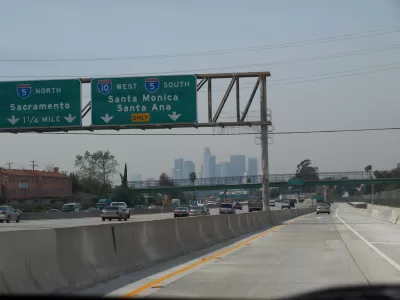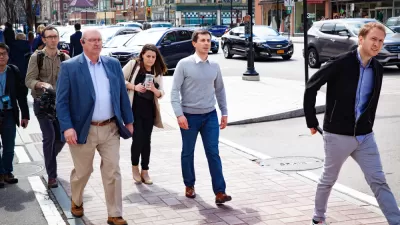The U.S. Department of Transportation nominee acknowledged the impact the interstate highway system has had on communities of color and vowed to mitigate the damage.

In a tweet following his statement accepting President-elect Biden's nomination for Secretary of Transportation, Pete Buttigieg promised to right the wrongs of the past, acknowledging that "Black and brown neighborhoods have been disproportionately divided by highway projects or left isolated by the lack of adequate transit." Buttigieg signaled that the Biden administration will seek to undo the damage done by prior federal policies and focus new efforts on ensuring more equitable outcomes.
The interstate highway system, one of the federal government's largest and most far-reaching transportation projects, has shaped the fate of cities with a heavy-handed, top-down approach that has isolated and displaced communities, impeded economic growth, and created public health crises in adjacent neighborhoods. Dismantling freeways is just one piece of the puzzle in undoing the damage of downtown expressways. New programs must work to restore affected communities without creating more burdens for Black and brown communities, writes Aaron Short. To achieve their goals and begin to address the decades-long structural effects of highway construction, the new administration will have to drastically shift federal funding for transportation infrastructure and ensure future policies put equity considerations first.
Urban planner Chris Sensenig, cited by Short in the source article, is optimistic that Buttigieg will deliver on his promises: "If the infrastructure bill is crafted to advance more than just the political interests of the few, we would hope that it would lead to investing in projects that further social and environmental justice issues."
FULL STORY: Nominee Buttigieg Vows To Dismantle ‘Racist’ Freeways

Maui's Vacation Rental Debate Turns Ugly
Verbal attacks, misinformation campaigns and fistfights plague a high-stakes debate to convert thousands of vacation rentals into long-term housing.

Planetizen Federal Action Tracker
A weekly monitor of how Trump’s orders and actions are impacting planners and planning in America.

San Francisco Suspends Traffic Calming Amidst Record Deaths
Citing “a challenging fiscal landscape,” the city will cease the program on the heels of 42 traffic deaths, including 24 pedestrians.

Defunct Pittsburgh Power Plant to Become Residential Tower
A decommissioned steam heat plant will be redeveloped into almost 100 affordable housing units.

Trump Prompts Restructuring of Transportation Research Board in “Unprecedented Overreach”
The TRB has eliminated more than half of its committees including those focused on climate, equity, and cities.

Amtrak Rolls Out New Orleans to Alabama “Mardi Gras” Train
The new service will operate morning and evening departures between Mobile and New Orleans.
Urban Design for Planners 1: Software Tools
This six-course series explores essential urban design concepts using open source software and equips planners with the tools they need to participate fully in the urban design process.
Planning for Universal Design
Learn the tools for implementing Universal Design in planning regulations.
Heyer Gruel & Associates PA
JM Goldson LLC
Custer County Colorado
City of Camden Redevelopment Agency
City of Astoria
Transportation Research & Education Center (TREC) at Portland State University
Jefferson Parish Government
Camden Redevelopment Agency
City of Claremont




























